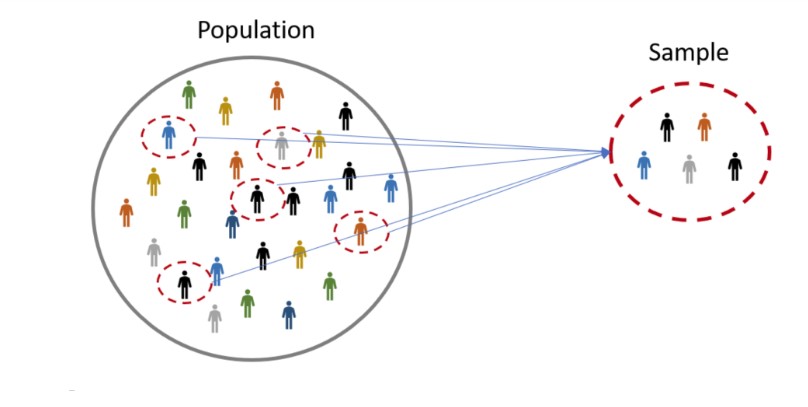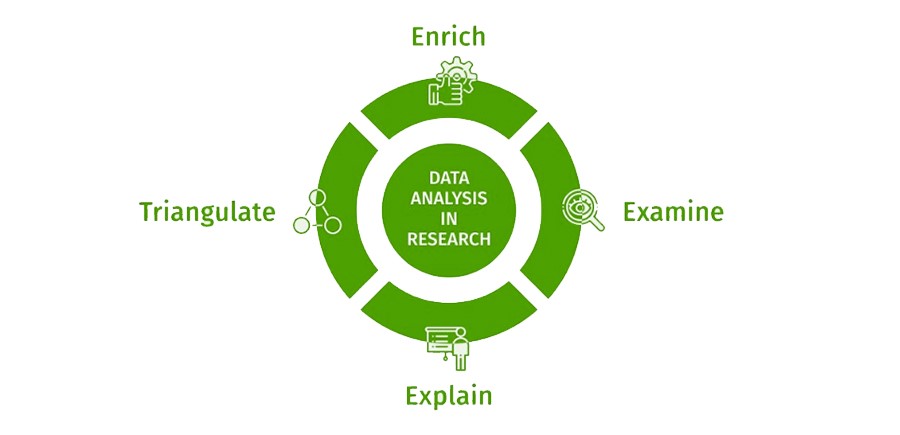Having big goals is good. It's exciting and inspiring too. But what matters most is the way those goals are achieved. Because if you set out to achieve all of them in one go, you will end up exhausted and nowhere. So, it is important to realize that goals are and will always be crucial to one's success, but what is even more important is the journey to achieving those goals. Because setting them won’t automatically lead to fulfilling them. Like the famous saying, that means, "matter, if not more than as much as the ends."
So stop focusing on just the ends and start realizing the potential and power of the means.
“Quality is never an accident; it is always the result of high intention, sincere effort, intelligent direction and skillful execution; it represents the wise choice of many alternatives.”
And in the case of research methodology, the quote by William A. Foster fits perfectly, because the better your process of doing the research, the better your results and findings will be.
What Is Research Methodology?
Whenever a dissertation is conducted, there is supposed to be a way of doing it. That is called a research methodology. After finalizing the theme and topic of your dissertation, you are clear on what you want to do. Next comes the part of deciding how the said goal will be achieved. A research methodology comprises of all the answers to the above mentioned question. In this section you will talk about:
- The type of research you did
- Methods of your data collection or selection
- Methods chosen for analyzing the data
- Any materials or tools you used in your research
- Explain why you opted for the particular method
In simpler words, dissertation research methodology is explaining what you did and how you did it.
Types of Research Methodology

Depending upon the kind of research you are trying to do and the findings, there is an option to opt out of either primary research methodology or secondary research methodology. In primary research, the researcher goes about collecting real-time data. This data was collected by the researchers themselves during the course of their dissertation. This data collected is under the direct control of the researcher. Primary research examples would be:
- Observation
- Interview
- Questionnaire
- Case study
- Focus group
When we talk about secondary research, there is an active use of "past data", i.e., data that was collected by someone else previously. This data could be found via past research documents, government records, and other offline and online sources. So, basically, the data in this type of research is re-analyzed. Some secondary research methodology dissertation example would be:
- Descriptive
- Correlational
- Experiments
- Quasi-experiment
There is no end to the list of topics or themes on which a dissertation could be written. From law to physics, every subject offers a vast variety of themes to be picked from. This could prove to be difficult at times, but the experts in research paper help can assist you with that effortlessly. Research returns to the fact that research can be of various types, and thus different types of research methodology are in place to achieve the goal of getting the work done properly.Here is a list of them to choose from:
- Quantitative Research
- Qualitative Research
- Descriptive Research
- Analytical Research
- Applied Research
- Fundamental Research
- Exploratory Research
- Conclusive Research
- Surveys
- Case Studies
All of them can be used to conduct research, but the purpose of having such an elaborate list of methodology in research was to facilitate the smoothness and ease of doing it. You can pick any one of the above-mentioned way to begin your dissertation.
Students also like to read: A Handbook for Writing Alluring Dissertation Introductions
Sample Size and Data Collection Tools
The most basic of all the parts and steps that are involved in the dissertation methodology is finding a sample and collecting the required data.
A sample size is just the number of people that will become part of the research. They are also called the subjects, and they are selected from the general population. This is done to make the task of research easier for the scholars, as they cannot conduct research on a large population. Sample size is considered to be the representative of real population for the purpose of the qualitative research methodology.
For example, if you are doing research to predict the reaction and acceptance of a certain age group towards a new product, then you will pick a small test sample from that particular population to represent the entire section. This selected group is called the sample size.

How to Select a Sample Size?
The question is very popular with students, and the answer lies in the formulas. Yes, there are specific formulas to find the perfect sample size for the purpose of dissertation research methodology.
- Formula for small sample size:

- Formula for large sample size:
SS= Z2 P(1-P)/C2
Where,
SS = Sample Size
Z = Z -Value
P = Percentage of Population
C = Confidence interval
Data collection is a crucial yet tedious task. There are various ways to do so. If your research is secondary, then you get to access the existing data from various online and offline sources. However, if you chose not to conduct primary data research, your task will be lengthy and require undivided attention and precision.All the collected data should be recorded safely for future use, and it should most definitely be free from any bias. Here are a few ways to collect data from the selected sample size:
- Interviews
- Observations
- Oral histories
- Questionnaires and surveys
- Documents and records
- Focus groups
- Snowball sampling
Data Analysis: What, When, and How?
Data analysis refers to the process of going through the data that is collected or gathered through secondary sources to study it and derive some useful and meaningful information out of the raw data. Data analysis follows a process that begins with data validation, followed by data editing, and data coding.

Data analysis is done right after the data is gathered and sorted in the proper manner. This could be done in any style preferred by the researcher, depending upon the kind of results they are seeking. Some examples of data analysis could be of any flow, like:
- Descriptive analysis - describing what happened
- Exploratory analysis - exploring data relationships
- Diagnostic analysis - diagnosing why something happened
- Predictive analysis - predicating what will happen
- Prescriptive analysis - prescribing how something will happen
When it comes to answering how data analysis is done, different methods come into play, like:
- Conjoint analysis
- Decision Trees
- Time series analysis
- Text analysis
- Data mining
- Factor analysis
- Neural networks
- Regression analysis
- Cohort analysis
- Cluster analysis
Students Also Like to Read: Unique 100+ AP Research Topics to Choose from!
How to Pen Down a Research Methodology?
When all of the above mentioned steps are completed, the process of writing the dissertation research methodology starts. It is simple and has the aim of putting into words what exactly was done and how it was done. Here are the steps for doing that:
Step 1: Describe your methodological strategy.
Step 2:Describe your data gathering and/or selection procedures.
Step 3:Describe your research methodology.
Step 4:Examine and defend your methodological decisions.
Always keep in mind that during the process of data analysis you must abstain from all the biases. Scientific integrity and science-society collaboration all depend on research ethics. These principles ensure that research subjects' involvement in the study was completely voluntary, well informed, and entirely safe.
You'll strike a balance between achieving significant research goals and employing ethical research methods and processes. There are some ethical considerations that a researcher must follow like:
Voluntary participation: Your participants have the option to join or leave the research at any time.
Informed consent: Before agreeing or declining to participate, participants are informed about the study's objective, benefits, risks, and funding.
Anonymity: The participants' identities are unknown to you. No personally identifiable information is gathered.
Confidentiality: You know who the participants are, but you keep it a secret from the rest of the group. You change personally identifying information so that no one else can track it to the actual person or their information.
Potential for harm: The risk of physical, social, psychological, and other forms of harm is maintained to a bare minimum.
Results communication: You ensure that your work is devoid of plagiarism and research misconduct and that your results are appropriately represented.
Still Facing Issues with Research Methodology? Take the Help of Experts!
There is so much that a student needs to keep in mind while doing research, and that just becomes intensified with the process of data collection and analysis. Overall, this blog has every piece of information that a student might need in order to write a
dissertation research methodology. If they still need more help, the doors of Global Assignment Help are always open for them. Here they not only get the best dissertation help in order to complete their research methodology chapter but can also reach out for help with assignments, research paper help, etc.
In addition to that, they also provide guarantees like:
- Assured Top Grades
- Timely Submissions
- 24/7 Student Support
- 100% Original Document
- Money-Back Guarantee
- Individual Attention
- Free Unlimited Amendments
Students also like to read:
Free Tools

Easy to Use Paraphrasing Tool to Simplify Complex Academic Writing
Check Now
Get Structured Outline by Professionals for Your Dissertation
Check Now
Effortlessly manage citations and references with our smart referencing tool
Check NowPrice Calculator
- Plagiarism
- Pricing
- Order Now
- Call Back
- Live Chat

Limited Time Offer
Exclusive Library Membership + Free 300$ Wallet Balance

Get $300 Now
Update your Number

























Thank you for submitting your comment on this blog. It is under approval. We will carefully review your submission and post it on the website.